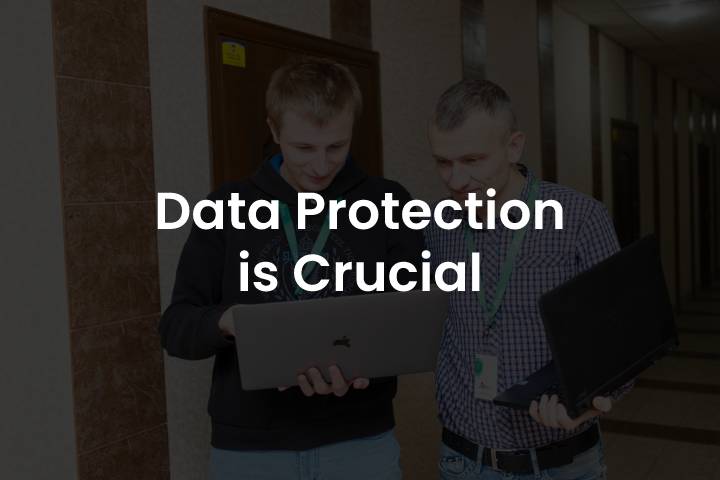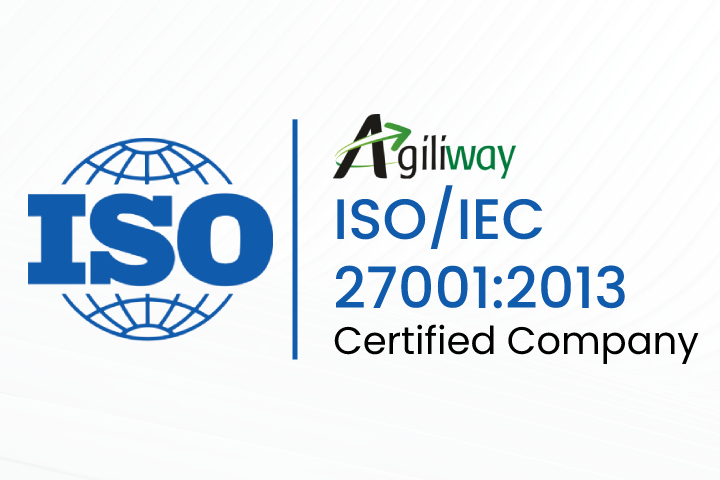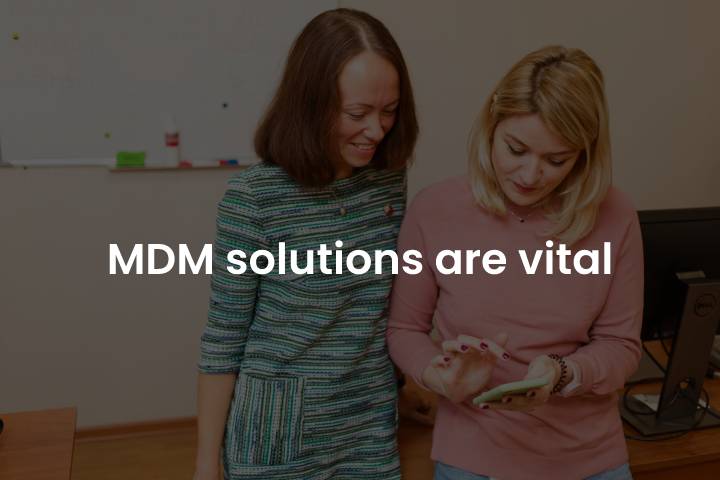Regulatory Decision-Making Solution for a Prominent Healthcare Provider
Navigating complex regulations with the decision-making solution in the healthcare industry is an important step for staying up-to-date and delivering …
 19 | 01 | 2022
19 | 01 | 2022 Today data is perceived as the most powerful tool. Organizations compete to obtain as much information about their existing and potential clients as possible. The disturbance around handling all that data and protecting them from unauthorized access has been a primary topic for multiple discussions. In the article, we are analyzing the main ways of ensuring that the clients’ data are safe and how these processes run in Agiliway.
Governments across the planet adopt multiple regulations that regulate how sensitive information is stored and treated as well as determine security requirements to avoid any data breach. For Agiliway, having customers from different countries requires following all these regulations to maintain successful collaboration and a high level of the services provided.
The General Data Protection and Regulation (GDPR) states that any organization or business that collects data on the territory of the EU, since May 25, 2018, obliges to follow the GDPR rules. In case of violation, the regulation imposes hefty fines amounting to up to €20 million or 4% of a business’s total revenue for the preceding financial year. The GDPR outlines lawfulness, fairness and transparency, purpose limitation, data minimization, accuracy, storage limitation, integrity and confidentiality, and accountability as key principles for security and protection.
Customers, or data subjects, give their consent to process and store their personal information. Under the GDPR, all data shall be removed if data subjects request to do so. The same rules apply to organizations holding on to the personal information of their employees. According to the current regulations, such data shall be removed immediately if requested as well. Additionally, consent forms have to be plain and clear to read and understand.
Companies are responsible for identifying and mitigating all the risks that may result in leaking sensitive information. These include all the policies and procedures inside an organization to be revised and explain how and where they store data, for how long they keep them, and under what terms these data can be transmitted to other parties.
Raising awareness among staff members is another crucial step in ensuring that clients’ data are protected. Conducting respective training within an organization is necessary to emphasize the significance of maintaining the information stored and managed in compliance with the GDPR.
In the United States, one of the strictest regulations regarding personal information management is the Health Insurance Portability and Accountability Act (HIPAA). Especially, when it comes to developing software products for the healthcare industry.
Since 1996, when HIPAA was first introduced, it has been regulating issues regarding insurance coverage, healthcare services quality, simplifying the procedures for both patients and entities carrying out these procedures. Under HIPAA, health data are not exposed uncontrollably and are highly protected. Patients are the primary decision-makers when it comes to releasing their information to a healthcare organization or their representatives.
Additionally, HIPAA guarantees that patients can get a copy of their health records. This is crucial as they can monitor and control, and, as a result, help avoid mistakes in these medical records. Besides, when they decide to change their healthcare providers, all the data is easily transmitted to them, thus, a lot of time is saved, e.g. there is no need to go through more testing if those were earlier taken.
Under CCPA regulation, every California resident not only has the right to request businesses to share what personal data of the given resident they have, how they treat and distribute these data. For-profit organizations that operate in California within the following criteria are subject to CCPA application toward them:
The CCPA envisages that information in the combination of an individual’s first and last name and social security number, personal IDs’ numbers (e.g. driver’s license, passport, military ID, etc.), financial information (including any security code or password), medical or health insurance information, biometric images that can grant access to personal information through facial recognition tech is considered a data breach. Under these conditions, a California resident can sue a business for a CCPA violation.
One of the main signs of a company’s reliability is ISO 27001:2013 certification that guarantees that their Information Security Management Systems (ISMS) are compliant with international standards. During the evaluation process, independent auditors analyze the internal processes of an organization on all levels across all the departments. ISO 27001:2013 certified company has ISO-compliant ISMS, grants utter customer confidence, is highly competitive, and follows the international regulations and laws. The main value you gain from choosing an ISO-certified company is a trustworthy and secure business relationship.

For software development companies, it is mandatory to follow data protection legislation and quickly adapt to the transformations around data handling. We need to make sure that no sensitive information can be leaked or misused. Agiliway utilizes multiple approaches, which help prevent unauthorized access to any private data, that are fully compliant with GDPR, HIPAA, CCPA, etc. which is proved by the independent ISO auditor.
The dynamics of the modern world drive people and organizations to become more and more flexible and mobile. Organizations needed to quickly adapt their infrastructures so that authorized employees could work remotely and have full access to the necessary information. Switching to the cloud has indeed simplified and improved the transition process. Those businesses faced less impact on their operations, therefore, didn’t lose as much as opposed to the organizations whose corporate data couldn’t be shared outside office premises. Moreover, switching to remote also revealed more of the potential risks carried by the organizations. Which resulted in stricter procedures have been developed that aim to control unauthorized access to corporate information.
With tons of sensitive data stored either on servers or in the cloud, taking different steps to safeguard them and prevent unlawful behavior toward them is crucial.
As stated in Recital 83 of the GDPR, “In order to maintain security and to prevent processing in infringement of this Regulation, the controller or processor should evaluate the risks inherent in the processing and implement measures to mitigate those risks, such as encryption.”
Encryption is a powerful cybersecurity tool that’s utilized to protect and transmit data, regardless of whether these are in-flight or at rest. For years, organizations built their policies based on Data Encryption Standard (DES), following which the data were encoded with 56-bit keys. Today, however, more advanced algorithms that are less likely to be hacked have replaced DES. Among them are Triple DES, Advanced Encryption Standard (AES), Twofish, Perfect Forward Secrecy (PFS), Rivest-Shamir-Adleman (RSA), Format Preserving Encryption (FPE), and more.
There are two types of encryption:
The growing concerns regarding cloud security are the result of the growing demand for cloud solutions. Hence, more organizations shift their infrastructures to this type of data storage environment. Indeed, cloud service providers are accountable for the security of their products, however, users and customers are taking full responsibility for what’s going on inside the cloud.
A virtual private network or VPN is one of the most effective tools to protect your data from corruption. It provides secure connections between two points that share an encryption key in the form of a password or algorithm. This way, data travel within a safe network as encrypted traffic and get decrypted in the defined destination point.
VPNs are advantageous for organizations as they provide
As a result of the extensive distribution of the corporate data, companies leverage the use of VPN and cloud services to track the behavior inside their infrastructures and, this way, envisage and prevent any data damage or leak.
The adoption of MDM tools allows IT departments to have remote access to the corporate devices that are used for working with confidential data. Not only these tools are efficient in terms of managing the work processes but also prevent undesired data leaks if a device was lost. Then the IT department can easily remove all the information from the device remotely. MDM policy is crucial for corporate networks security simplifying the process of managing access to the specific data and providing remote support for the connected devices.

MDM is a huge part of enterprise mobility management (EMM), which covers
For the sake of security, MDM solutions are vital, especially today, when employees often use their own devices.
Every business that operates on an international level and partners with foreign clients has to ensure that no political or economic situations impact heavily on the processes, their personal data is secure and business operations continue regardless. As a software development service provider, Agiliway has developed the BCP to ensure their clients that operations of the company could not be impacted by various causes. These measures are expected not only to protect the clients’ data but also to guarantee the company running amidst the different situation.
To ensure proper operations, the BCP envisages all the possible risks, e.g., regarding connectivity, corporate data, infrastructure, facilities, electricity supply, etc. We established distributed infrastructure so that all clients’ information is stored in the cloud with servers located in Europe and the US. Agiliway takes all the necessary steps to avoid any disruption to the development, and make sure about smooth and highly productive processes.
Living in an era where data is viewed as the most valuable asset, they shall be treated accordingly. Transition to the cloud, adoption of data protection policies, and business continuity planning are the key aspects for secure data management. Having an established scope of regulations that work perfectly for your company’s data management is the first step toward building a secure environment and showing your clients that you are a trustworthy partner.
Agiliway caters to the needs of our clients by providing high-level data protection procedures which will not be impacted by the outside factors of various nature owing to its well-developed business continuity strategy.
READ ALSO: BUILDING A FULLY FUNCTIONAL MDM SOLUTION FOR PROTECTING CORPORATE DATA
Navigating complex regulations with the decision-making solution in the healthcare industry is an important step for staying up-to-date and delivering …
Welcome back to the tech news rubric. This month’s tech news is bursting at the seams! We’ll explore the latest …
The travel industry has undergone a massive transformation in recent years, with travelers increasingly booking vacations and making travel arrangements …